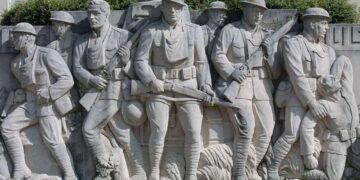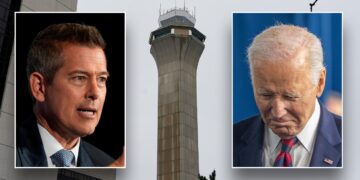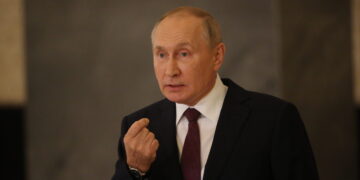To believe america is losing its power and standing in the world u.s editor john prudeau joins washington bureau chief james astill and senior editor james bennett to discuss whether these are genuine signs of a superpower in decline so so my question to you is is america in decline and how do you go
About thinking about that question and and i think the top line is that it doesn’t need to be america has has blundered in its foreign policy spectacularly in the past and come back equally spectacularly there was a great deal of declinism around in the mid late 70s after um the disaster in vietnam
And you know um a little more than a decade later america had won the cold war uh and was embarking on a period of untrammeled unipolar um supremacy the sources of america’s you know enormous strength are still pretty much intact it has a young population it has a flagging but still you know
Rather impressive degree of economic dynamism it has problems absolutely and it has growing problems around inequality um some of its poor social indicators around health and education it uh it has a growing climate crisis of its own i would suggest that these are considerable problems new problems but america has faced considerable new
Problems in the past in the past it has had an impressive ability to change tack to improvise to problem solve america’s ability to get things wrong and then reinvent itself is famously one of its great qualities and the thing that gives so many of us pause right now in response to that
Question is america in absolute decline is that it’s problem-solving ability um has been uh somewhat stagnant for a good while and this is of course a result of the extreme political dysfunction that we see at the federal level the dysfunction is being exacerbated by extremism on both sides but in particular
Far right of the republican party which is now the balance of power in the republican base which seems to be turning against those problem-solving institutions in particular american democracy itself hence um the the the violent end to the trump uh administration the the so-called coup attempt um that
Took place on capitol hill in january james bennett same question to you but perhaps let’s stick with the foreign policy piece of this for now rather than talking about domestic policy i do think it’s hard not to conclude that america largely wasted its unipolar opportunity over the last 30 years
In foreign policy that it find it found itself somewhat to its surprise the victor of the cold war in the early 1990s it was followed by this kind of time of searching in the clinton years to figure out what america’s proper role in the world should be what it should do with all
This economic and military might and there was some uh to and frowing about liberal interventionism should we use it be using america’s power to advance human rights we didn’t do so in rwanda where we could have prevented a genocide we did do so in probably from learning that lesson in the balkans
And then came 911 and that in many ways supplied the orientation that um the leadership class national security establishment was looking for and clarified to many people’s minds what america’s role in the world should be and it argued very much in favor of intervention um uh wherever we detected a threat regardless of
Sovereign boundaries and we’ve now we’re now at the end of really this 20-year experiment in power projection and i can understand why it looks um and can feel to an american like decline because it involves retreat i mean america is withdrawing from it’s it’s very aggressive posture in the world it’s withdrawing from
Um uh afghanistan obviously and ending combat operations in iraq there’s been a lot of articles and think tank papers recently about american overreach and foreign policy if something like the rwandan genocide were underway now do you think america would send troops to attempt to stop it
Or do you think that the fatigue with the 911 wars and with the deployment of america’s military and what now seem like causes that aren’t central to the national interest um would mean that america would revert to its mid-90s posture the biden administration is chocked full of former advocates of liberal intervention biden
Himself voted for the iraq war voted for the afghanistan war and was one of the leading proponents of intervention in bosnia intervention of some kind in bosnia in the mid 90s so um that elite opinion i said i i suggest has not sort of um completely changed and become
Isolationist has aligned itself with the instinctive very very long-standing public uh reluctance to see america engage militarily in the world and i think that you know for one thing um a cataclysmic event another 911 or some other you know perhaps unimaginable um catalyst of that nature would change
Everything and america still has the capabilities and then many of its institutions especially the the department of defense the instincts to intervene militarily in the world so i wouldn’t rule that out i think we should switch now to the domestic part of american decline what longer term investments can american leaders and
Citizens make to turn around um especially america’s political and social decline evidence for america the the continuing dynamism of the american economy um the power of immigrant contribution to american life the ability of americans to kind of invent the future you know exhibit a for that is probably now what’s happened in
Silicon valley um over the last few decades and and most recently the rise of these uh social networks in the u.s they are also now a huge source of our political difficulty and how they figure out what their responsibilities are to american civil culture not just american i think the global civic
Culture and then how they enforce those responsibilities is just a huge question and we’ve seen facebook twitter take some baby steps towards acknowledging that responsibility and trying to act on it but i don’t i don’t pretend it’s an easy problem to solve it’s a tremendous difficulty and it’s part of what is
I think injecting on a daily basis venom into our political life poison into our political discourse and also just making it harder and harder to do anything about other sorts of institutional problems the infrastructure bill actually gives me a little bit of hope because here’s a problem that i think we
Can all acknowledge the us has had for some time and we actually have seen a major piece of bipartisan legislation um thanks to really hard patient work by some legislators you know make it through and so that suggests it’s absolutely it’s not actually impossible how much do you think
Will be solved by these infrastructure bills what’s about to happen is is quite a big deal isn’t it yes it is um uh i i i think the very much the combination of of the infrastructure bill um passed as we expect um in in the regular uh way with
The uh the more partisan uh budget bill that the democrats want to to throw a couple or maybe even three trillion dollars of spending into to to to enforce you know in terms of soft infrastructures um uh social um uh services et cetera and what they’re spending on hard infrastructure that
That combination um you know in inefficient spending money not necessarily the best way to reform and improve america nonetheless does does represent a lot of potential progress and i i would signal um the prospects for um a massive roll out of climate related infrastructure which in turn has the
Potential to change the politics of of climate change in certain industries um and interest groups and in the states perhaps even more than at the national level that’s a big deal and after you know these these decades of essentially no major movement on climate at the federal level in america that’s
Something to to to watch uh and be optimistic about james b i’m going to give what i think will probably be the last word to you you began by talking about this history of decliners in in america is this just something cyclical that’s going on now how do you tell when
Declinism is justified and and when it’s not declinism does have a long and honorable tradition in american history it really does go right back to the massachusetts bay colony almost as soon as people arrived here they were worried that the settlers arrived that that things were going to hell this does
Not mean the decline is aren’t ultimately going to be right but um it is it is part of our national character and and arguably actually is historically kind of a source of strength the the parallels have been drawn between this period and the and the um
The late 19th century i think for very good reason in terms of the degree of disorienting change that we’ve experienced the capture of our politics by big money and big interest henry adams was probably the most eloquent voice then for american decline or global decline you know i mean among the things
He cited as evidence of civilizational decline decay was impressionism so you know he had a good case to be made he had a good case we made he do some data points that don’t look so good in retrospect but the point is that what
Came out of that was again as in the 70s a period of really tremendous reform and rejuvenation the progressive era and you know the hopeful part of me notwithstanding the degree of political stasis that we’re experiencing you know clings to the idea that we can pull that off again
You can read more of our coverage on american power by clicking on the link thanks very much for watching and don’t forget to subscribe

































 Reaction & Commentary
Reaction & Commentary










